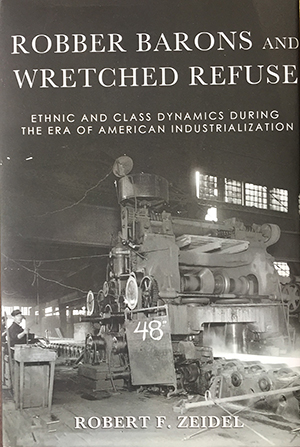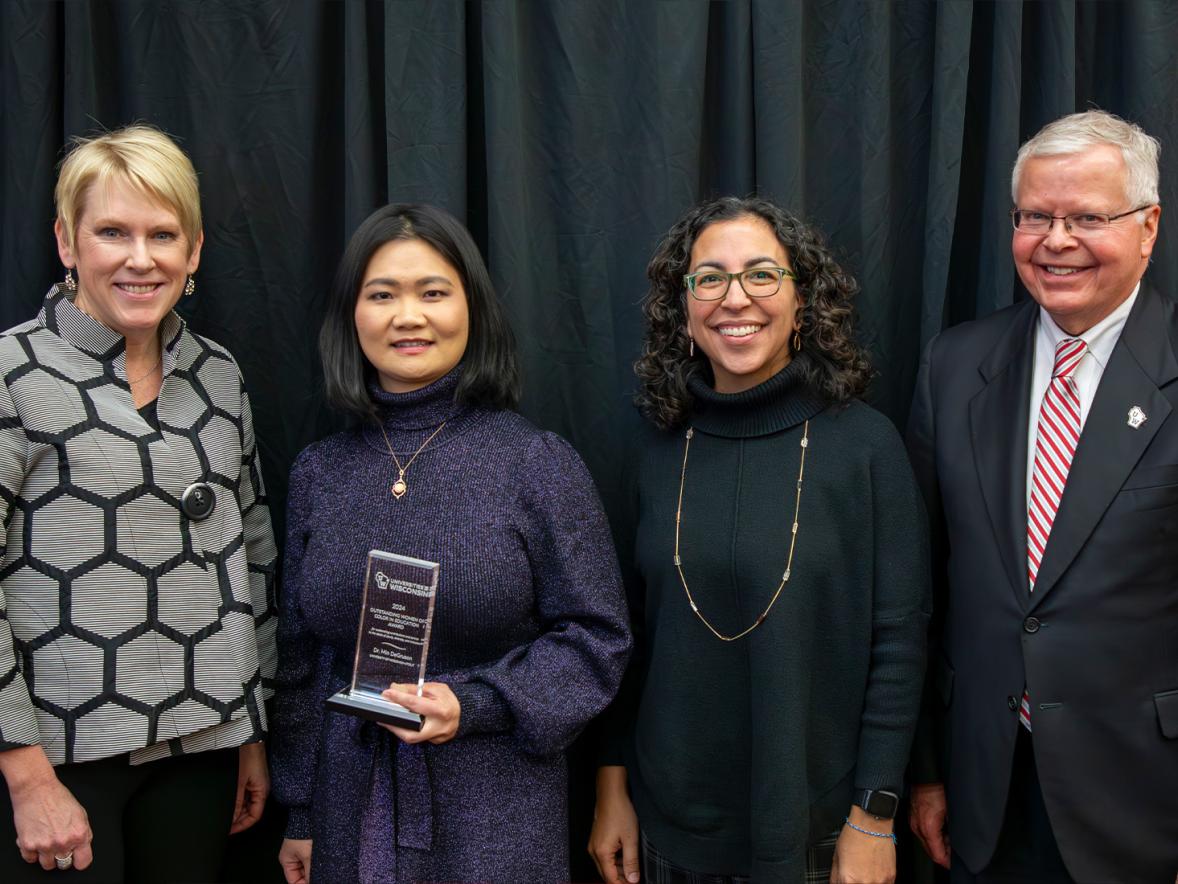From the Civil War to the mid-1920s America saw big business replacing small ones. Industrialization created immense wealth, but the distribution of that wealth and treatment of the laborers working in those industries created social turmoil.
Robert F. Zeidel, University of Wisconsin-Stout professor of history and interim dean of the College of Arts, Communication, Humanities and Social Sciences, tackles the issues of the American Industrial Era in his 306-page book “Robber Barons and Wretched Refuse: Ethnic and Class Dynamics During the Era of American Industrialization.” The book was published by Northern Illinois University Press with Cornell University Press in March. The book is available here for $49.95 in hardcover or $24.99 for an e-book.
Zeidel, who has taught at UW-Stout 30 years, started the book about six years ago. He took a sabbatical during the 2015-16 school year to work on it.
“Since I was a graduate student, I have always been interested in U.S. immigration,” Zeidel said. “I always have been focused on the industrial era with the rise of the robber barons and the immigration workers filling the factories and working in the mines. I’ve always been fascinated by the rise of modern America. I find it fascinating that in this era immigrants were an essential component for the rise of big business, but then big business became suspicious of immigrants.”
Laborers seek voice in workplace
During the time as industry grew and prospered, laborers desired some voice in wages and working conditions, Zeidel noted in the book. “Management and its supporters habitually responded with a strategy of defining the workers’ protests as the product of imported radicalism and identifying immigrants as the purveyors of these dangerous foreign doctrines,” he wrote. “Placing blame for the unrest on foreigners proved to be an effective means of social control.”
Employers did not look at their own practices for causes of workplace conflict, Zeidel noted.
Americans, those who considered themselves the established population at the time, saw their country as a land of liberty where immigrants could breathe free, Zeidel noted. “Yet this freedom did not include the right to embrace ideologies that condemned U.S. capitalism or criticized the policy that supported it, let alone any efforts to overthrow it,” Zeidel wrote.
“To me the tragedy of the era was that instead of vilifying immigrants, they should have been listened to and their voices should have been allowed to be heard,” said Zeidel who has a bachelor’s degree in history from Carroll College in Waukesha and a master’s in history and doctorate in American history from Marquette University in Milwaukee.
Industrialists condemned any workers who sought higher wages and better working conditions as radicals, claiming they were un-American, but yet relied on immigrant labor to help during the years of rapid commercial expansion in large-scale manufacturing, mining and transportation.
“The difficulty came on the socio-economic side of it,” Zeidel said. “When the conflict boiled over the same managers who hired immigrants said those workers were the cause of it. I think it was easy to blame the immigrant agitators as outside factors rather than look introspectively.”
‘Sweeping history of immigrants and industrialization’
Zeidel’s book offers a “sweeping history of immigrants and industrialization in an age of immense change,” said Katherine Benton-Cohen, associate professor of history at Georgetown University in Washington D.C., and author of the book “Inventing the Immigration Problem.” “This book shows us that immigrant workers have had hopes, dreams and points of view that shaped our economy and culture.”
David Roediger, Foundation Professor of American Studies at the University of Kansas. Lawrence, Kansas, said Zeidel’s book “reveals important points about ethnoracial class relations as central to the dynamics of both workplaces and of attitudes and policies toward immigrants in the industrialized United States. There is no comparable existing work.”
Stigmatizing immigrants as subversives contributed to the passage of the Quota Acts, which stemmed the flow of foreign workers. Post-World War I employers argued for preserving the open doors, and their workforce. However, the negativity that those employers had assigned to foreign workers contributed to the immigration doors closing.
Zeidel is also the author of “Immigrants, Progressives, and Exclusion Politics: The Dillingham Commission, 1920-1927” published in 2004. In the book, Zeidel introduces the 9 members of the Dillingham Commission, created by the Immigration Act of 1907, and follows them as they gathered facts to present in an unbiased report about immigrants. The report, which was largely positive about immigrants, was employed to justify limiting immigration to the U.S. The book is available here in hardcover for $46.50.
Today again America seems not to be listening to all voices, including those of immigrants, Zeidel noted “We want to build a wall instead of having a rational discussion and let all sides be heard and formulate policies,” he said. “Let’s do better this time. Let’s have a rational discussion and not determine the voices we don’t like are seditious.”
Photo
Book cover






